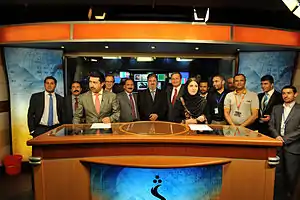Communications in Afghanistan
Communications in Afghanistan is under the control of the Ministry of Communications and Information Technology (MCIT). It has rapidly expanded after the Karzai administration took over in late 2001, and has embarked on wireless companies, internet, radio stations and television channels.

The Afghan government signed a $64.5 million agreement in 2006 with China's ZTE on the establishment of a countrywide optical fiber cable network. The project began to improve telephone, internet, television and radio broadcast services throughout Afghanistan. About 90% of the country's population had access to communication services in 2014.[1]
Afghanistan uses its own space satellite called Afghansat 1. There are about 18 million mobile phone users in the country. Telecom companies include Afghan Telecom, Afghan Wireless, Etisalat, MTN, Roshan, Salaam and a few others. Over 60% of the population have access to the internet.
Telephone
There are about 32 million GSM mobile phone subscribers in Afghanistan as of 2016, with over 114,192 fixed-telephone-lines and over 264,000 CDMA subscribers.[2][3] Mobile communications have improved because of the introduction of wireless carriers into this developing country. The first was Afghan Wireless, which is US based that was founded by Ehsan Bayat. The second was Roshan, which began providing services to all major cities within Afghanistan. There are also a number of VSAT stations in major cities such as Kabul, Kandahar, Herat, Mazari Sharif, and Jalalabad, providing international and domestic voice/data connectivity. The international calling code for Afghanistan is +93. The following is a partial list of mobile phone companies in the country:
- Afghan Wireless, provides 4G services
- Etisalat, provides 4G services
- MTN Group,[4][5] provides 4G services
- Roshan
- Salaam Network
- Wasel Telecom
All the companies providing communication services are obligated to deliver 2.5% of their income to the communication development fund annually. According to the Ministry of Communication and Information Technology there are 4760 active towers throughout the country which covers 85% of the population. The Ministry of Communication and Information Technology plans to expand its services in remote parts of the country where the remaining 15% of the population will be covered with the installation of 700 new towers.
Phone calls in Afghanistan have been monitored by the National Security Agency according to WikiLeaks.[6]
MTN-Afghanistan
MTN 21 According to a three-year duopoly agreement between the MCIT and mobile operators AWCC and Roshan, no mobile operator could enter the Afghan telecom market until July 2006. The third GSM license was awarded to Areeba in September 2005 for a period of 15 years, and a total license fee of $40.1 million. Areeba was a subsidiary of the Lebanon-based firm Investcom in consortium with Alokozai-FZE. After commencing services in July 2006, Areeba had an estimated subscribership of 200,000 by the end of that year. Areeba was later acquired by the South African-based Mobile Telephone Network (MTN) in mid-2007 as part of a $5.53 billion global merger between the two companies. MTN-Afghanistan is a subsidiary of the South African-based MTN Group, a multinational telecommunications company operating across the Middle East and Africa. MTN is the majority (90%) shareholder, while International Finance Corporation (IFC) at 9% is also a debt and equity shareholder of MTN-Afghanistan. MTN operates at 900–1800 MHz GSM band, and as of 2012 has 4.5 million subscribers and service coverage in most major cities, 464 districts, and all 34 provincial capitals. With over $400 million in total investment, MTN offers mobile voice, SMS, MMS, SRS, GPRS, fax, voicemail and PCO services through prepaid, postpaid and corporate tariffs.
MTN has interconnection agreements with all national telecom operators and provides international voice and SMS roaming in 121 countries and across 227 operators through prepaid and postpaid roaming tariffs. MTN also has a national ISP license which the company received in November 2008. MTN was the first company to introduce the popular per-second billing system in the country (also known as "pay as you talk") allowing its subscribers to transparently track their talk-time and receive billing summaries via SMS. The scheme was so popular that other GSM companies quickly adopted this method.
Internet

Afghanistan was given legal control of the ".af" domain in 2003, and the Afghanistan Network Information Center (AFGNIC) was established to administer domain names. As of 2016, there are at least 55 internet service providers (ISPs) in the country.[7] Internet in Afghanistan is also at the peak with over 5 million users as of 2016.[8]
According to the Ministry of Communications, the following are some of the different ISPs operating in Afghanistan:[2]
Television

There are over 106 television operators in Afghanistan and 320 television transmitters, many of which are based Kabul, while others are broadcast from other provinces. Selected foreign channels are also shown to the public in Afghanistan, but with the use of the internet, over 3,500 international TV channels may be accessed in Afghanistan.[9]
Radio
There are an estimated 150 FM radio operators throughout the country. Broadcasts are in Dari, Pashto, English, Uzbeki and a number of other languages.[9]
Radio listeners are generally decreasing and are being slowly outnumbered by television. Of Afghanistan's 6 main cities, Kandahar and Khost have the maximum number of radio listeners. Kabul and Jalalabad have moderate number of listeners. However, Mazar-e-Sharif and especially Herat have very few radio listeners.[10]
Postal service
In 1870, a central post office was established at Bala Hissar in Kabul and a post office in the capital of each province. The service was slowly being expanded over the years as more postal offices were established in each large city by 1918. Afghanistan became a member of the Universal Postal Union in 1928,[11] and the postal administration elevated to the Ministry of Communication in 1934.[12] Civil war caused a disruption in issuing official stamps during the 1980s–90s war[13] but in 1999 postal service was operating again. Postal services to/from Kabul worked remarkably well all throughout the war years. Postal services to/from Herat resumed in 1997.[14] The Afghan government has reported to the UPU several times about illegal stamps being issued and sold in 2003 and 2007.[15][16]
Afghanistan Post has been reorganizing the postal service in 2000s with assistance from Pakistan Post.[13] The Afghanistan Postal commission was formed to prepare a written policy for the development of the postal sector, which will form the basis of a new postal services law governing licensing of postal services providers. The project was expected to finish by 2008.[17]
Satellite
In January 2014 the Afghan Ministry of Communications and Information Technology signed an agreement with Eutelsat for the use of satellite resources to enhance deployment of Afghanistan's national broadcasting and telecommunications infrastructure as well as its international connectivity. Afghansat 1 was officially launched in May 2014, with expected service for at least seven years in Afghanistan. The Afghan government plans to launch Afghansat 2 after the lease of Afghansat 1 ends.[18]
References
- Khetab, Muhammad Hassan (January 1, 2014). "90pc of Afghans get access to telecom services". Pajhwok Afghan News. Retrieved July 10, 2014.
- "Statistics". Ministry of Communications (Afghanistan). 2017. Archived from the original on April 7, 2014. Retrieved May 24, 2017.
- "Whitepages.af, phone system in Afghanistan". Archived from the original on April 2, 2012. Retrieved September 16, 2011.
- Areeba AfghanistanArchived June 9, 2007, at the Wayback Machine
- MTN Group | Home
- "Archived copy". Archived from the original on April 7, 2014. Retrieved May 24, 2017.CS1 maint: archived copy as title (link)
- "Archived copy". Archived from the original on May 28, 2011. Retrieved June 16, 2011.CS1 maint: archived copy as title (link) Altai Consulting, July 2010, Media in Afghanistan
- "Kabul: Streets with no names". BBC News. September 29, 2011. Retrieved September 30, 2011.
- "afghanpost.gov.af – About".
- "Postal Authorities A".
- "Afghanistan @ Stamps". Archived from the original on April 24, 2008. Retrieved April 5, 2008.
- "2003 UPU Circular" (PDF).
- "2007 UPU Circular" (PDF).
- "Afghanistan Postal commission" (PDF).
- Khetab, Muhammad Hassan (May 10, 2014). "Afghanistan's maiden satellite launched". Pajhwok Afghan News. Retrieved May 10, 2014.